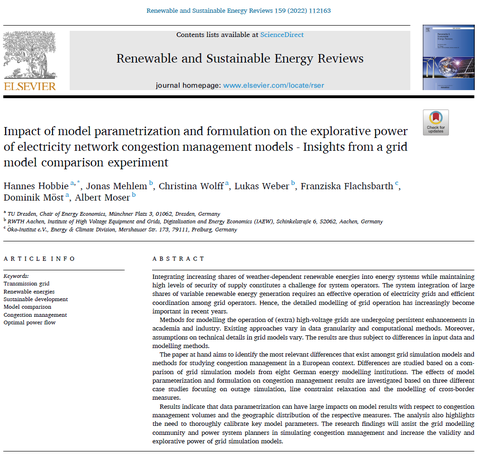Feb 11, 2022
New Publication "Impact of model parametrization and formulation on the explorative power of electricity network congestion management models - Insights from a grid model comparison experiment"
Together with Jonas Mehlem, Lukas Weber and Albert Moser from the RWTH Aachen and Franziska Flachsbarth from the Öko-Institut, Hannes Hobbie, Christina Wolff and Dominik Möst analyse what influence the model parametrization and formulation can have on the validity of electricity congestion management models. The study was conducted as part of the MODEX-NET project funded by the BMWi, which provides insights on experiments for grid model comparison.
The open-access article can be downloaded for free:
https://doi.org/10.1016/j.rser.2022.112163
Highlights
- Various differences in model formulations for grid operation exist in academia.
- Soft-constraints are widely used to detect data inconsistencies and infeasibilities.
- Simplified outage simulations particularly impact congestion results in meshed grids.
- Parametrization of cross-border measures largely affects congestion volumes.
Summary
Integrating increasing shares of weather-dependent renewable energies into energy systems while maintaining high levels of security of supply constitutes a challenge for system operators. The system integration of large shares of variable renewable energy generation requires an effective operation of electricity grids and efficient coordination among grid operators. Hence, the detailed modelling of grid operation has increasingly become important in recent years.
Methods for modelling the operation of (extra) high-voltage grids are undergoing persistent enhancements in academia and industry. Existing approaches vary in data granularity and computational methods. Moreover, assumptions on technical details in grid models vary. The results are thus subject to differences in input data and modelling methods.
The paper at hand aims to identify the most relevant differences that exist amongst grid simulation models and methods for studying congestion management in a European context. Differences are studied based on a comparison of grid simulation models from eight German energy modelling institutions. The effects of model parameterization and formulation on congestion management results are investigated based on three different case studies focusing on outage simulation, line constraint relaxation and the modelling of cross-border measures.
Results indicate that data parametrization can have large impacts on model results with respect to congestion management volumes and the geographic distribution of the respective measures. The analysis also highlights the need to thoroughly calibrate key model parameters. The research findings will assist the grid modelling community and power system planners in simulating congestion management and increase the validity and explorative power of grid simulation models.

